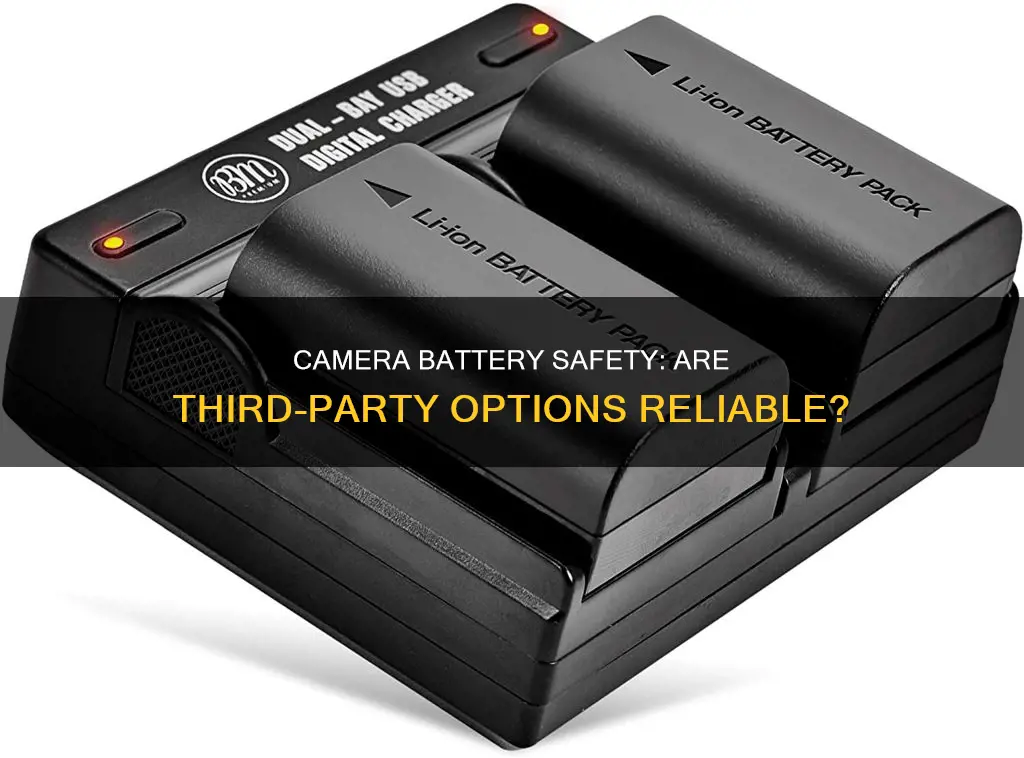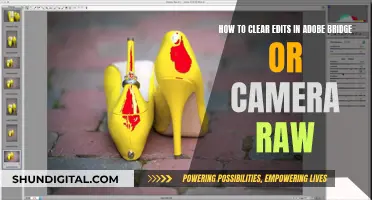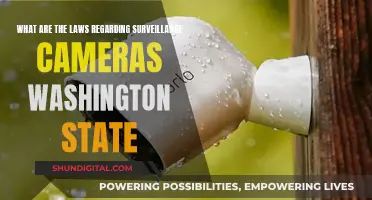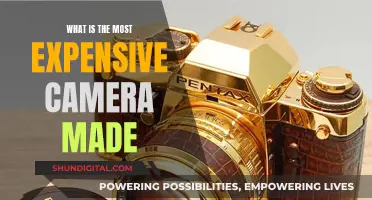
Third-party camera batteries, also known as off-brand or aftermarket batteries, are those made by companies other than the original camera manufacturer. While some people may be hesitant to use them due to safety concerns and the risk of voiding their camera's warranty, others find them to be a more affordable and accessible option. So, are third-party camera batteries safe to use?
| Characteristics | Values |
|---|---|
| Cost | Third-party batteries are usually cheaper than original brand batteries. |
| Ease of Purchase | Third-party batteries are easily available online. |
| Compatibility | Third-party batteries come in a variety of shapes and sizes, making it easy to find one that fits your camera. |
| Quality | Third-party batteries are usually lower quality and may not last as long as original brand batteries. |
| Warranty | Using third-party batteries may void your camera's warranty. |
| Safety | Third-party batteries are generally safe to use but there have been rare cases of batteries swelling, overheating, or causing camera malfunction. |
What You'll Learn

Are third-party batteries more affordable?
The short answer is yes. Third-party camera batteries are generally much cheaper than their original brand-name counterparts.
Original camera batteries, also known as OEM (Original Equipment Manufacturer) batteries, are designed by the camera manufacturer and therefore come at a premium cost. For example, the new Nikon battery released in 2022, the EN-EL18d, is priced very high.
Third-party batteries, on the other hand, are made by companies that did not create the original battery. They are often sold at a fraction of the cost of OEM batteries, sometimes even as low as a quarter to half the price. This means you can buy multiple third-party batteries for the price of one OEM battery, which is beneficial if you need extra batteries for a long shoot.
It's worth noting that the price difference doesn't always indicate a difference in quality. In some cases, third-party batteries may have lower power and longevity than OEM batteries, but this is not always the case. Some third-party batteries have more storage capacity or include microchips to monitor power levels, just like OEM batteries.
When purchasing third-party batteries, it's important to do your research and buy from reputable companies and dealers to ensure you get a good-quality product.
Rechargeable Camera Batteries: Charged or Not When Bought?
You may want to see also

Do third-party batteries offer the same power?
Third-party batteries are designed by companies outside of the original camera manufacturer. They are often cheaper than the original batteries, but this comes at a cost.
Users often report that third-party batteries do not last as long as their branded counterparts. They may deplete faster when taking photos, or they may have a shorter lifespan. This is because third-party batteries do not necessarily offer the same capacity as their branded equivalents.
For example, the Nikon EN-EL15c battery has a capacity of 2280 mAh, whereas the Wasabi equivalent has a capacity of 2000 mAh. A higher capacity will give you more operating time.
However, third-party batteries are not always less powerful than their original counterparts. Many good aftermarket batteries have more storage capacity.
It is important to note that some third-party batteries may not be compatible with your camera. They may not be recognised by the camera, or they may not recharge using the original charger.
Overall, while third-party batteries may offer a cheaper alternative, they may not provide the same power or longevity as the original batteries. It is important to research and read reviews before purchasing.
Charging Your Kodak Camera Battery: How Long Does It Take?
You may want to see also

Are third-party batteries lower quality?
Third-party camera batteries are often cheaper than their original counterparts, but are they lower quality?
The answer is yes, sometimes. Some third-party batteries are better than others. Users report that third-party batteries do not always last as long as brand-name batteries. They may deplete faster when taking photos or have a shorter lifespan. This is because third-party batteries do not always have the same specifications as their original counterparts. For example, the Nikon EN-EL15c battery has 2280 mAh, while the Wasabi equivalent has 2000 mAh. The higher the mAh number, the more operating time the battery will provide.
However, third-party batteries are not always less powerful than the originals. Many good third-party batteries have more storage capacity. For instance, the Powerextra LP-E6NH battery for Canon cameras has a higher capacity of 2950 mAh compared to the Canon battery.
It's important to note that extreme problems with third-party batteries are rare. While some reviews note worrying problems, such as batteries causing cameras to explode, these issues appear to be uncommon with batteries from established companies. Most reviewers are satisfied with their choice and do not report significant issues.
When purchasing third-party batteries, it's recommended to buy from reputable manufacturers to ensure safety and performance.
Charging Vintage 8mm Cameras: A Step-by-Step Guide
You may want to see also

Can third-party batteries damage my camera?
Third-party batteries are those made by companies that did not create the original battery. They are often cheaper than original batteries, but there are some pros and cons to consider before buying them.
Firstly, it's important to note that using a third-party battery could potentially void your camera's warranty. Secondly, while some third-party batteries provide the same power as original batteries, others have lower capacity and may not last as long. This can be a problem if you're expecting a certain amount of usage time, and it's worth noting that third-party batteries may not achieve your camera's max frame rate.
Another disadvantage is that some third-party batteries have poor manufacturing standards, which can lead to batteries swelling after sustained use. This can be a major issue if it happens inside your camera. Additionally, camera companies sometimes fix" battery problems with firmware upgrades that can lock out third-party batteries, rendering them useless.
On the other hand, third-party batteries are usually less expensive than original batteries, and you can often find them easily online. They come in a variety of shapes and sizes, so you can likely find one that fits your camera. Some third-party batteries even offer higher capacity than their original counterparts, and some reputable brands include microchips to monitor power levels.
Overall, while there are some risks associated with third-party batteries, many photographers use them without issue. It's important to do your research and buy from a reputable brand to minimise the chances of encountering problems.
Charging Camera Batteries: Field Strategies for Photographers
You may want to see also

What are the best third-party batteries for my camera?
Third-party batteries are generally considered safe to use, although there are some potential issues to be aware of. These include reduced power and longevity, and in some rare cases, batteries swelling, becoming hot, or ruining cameras. However, these issues appear to be rare when purchasing from established companies, and the affordable cost of third-party batteries outweighs the potential problems.
When purchasing third-party batteries, it is important to buy from reputable sources to avoid fake products that may damage your camera. Some recommended third-party battery brands include:
- BM Premium: Compatible with Canon and Nikon cameras, BM Premium offers batteries at a lower cost than the original equipment manufacturer (OEM) batteries, and they come with a one-year warranty and safety guarantee.
- Neewer: Compatible with Sony Alpha series cameras, Neewer batteries provide the same capacity as Sony batteries but at a more affordable price.
- Wasabi Power: Compatible with Canon, Nikon, and Fujifilm cameras, Wasabi Power batteries are a good option for those seeking a lower-cost alternative, although there have been some reports of communication errors and issues with battery life.
- Powerextra: Compatible with Canon and Sony cameras, Powerextra batteries offer higher capacity than OEM batteries and are available at a more affordable price.
- FirstPower: Compatible with Fujifilm cameras, FirstPower batteries provide slightly higher capacity than OEM batteries and are available at a lower cost.
When choosing a third-party battery, it is important to ensure compatibility with your specific camera model and to be aware of any potential differences in capacity and performance compared to OEM batteries. Additionally, consider purchasing from trusted retailers or local camera shops to ensure the authenticity and quality of the product.
Charging the Nokia Camera: A Quick Guide
You may want to see also







